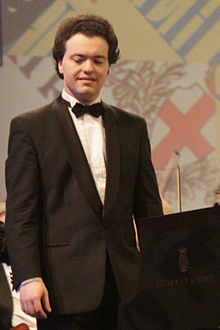
Evgeny Kissin virtuoso pianist
A world renowned virtuoso pianist, Evgeny Kissin was born with talent. He has written his memoirs (at the ripe old age of 46) supposedly telling how it felt to be someone like him, someone who was a child prodigy and was drawn to music from a very early age. I haven’t read the book, only the book review (in my TLS) but it says something of how he felt being a child who mastered music at the age of two.
Evgeny Igorevitch Kissin (Yevgeniy Igorevich Kisin); was born on the 10th October 1971 and has been a British citizen since 2002 and an Israeli citizen since 2013. He first came to international fame as a boy of twelve, when he played both Chopin, Liszt and Rachmaninov and has audiences queuing round the block ever since. He has a wide repertoire and is especially known for his interpretations of the works of the Romantic era. He is commonly viewed as a great successor of the Russian piano school because of his virtuosity and powerful key touch.
He wasn’t without famous predecessors, Vladimir Horowitz, (1903 -1989) whom I saw at a concert many years ago, was also extremely talented and very well known, but Kissin as a child prodigy was recognised early. In 1997 he was the first pianist honoured with his own Proms solo recital at the Royal Albert Hall. It drew the largest crowd yet seen at the Proms, and I attended that performance with a girlfriend and we were in awe. The encores, well deserved, went on and on.
Kissin was born in Moscow to a Russian Jewish family. At age six, he began piano studies at the Gnessin State Musical College in Moscow. At the school, he became a student of Anna Kantor, who remained Kissin's only piano teacher. Kantor was a big part of his life. He was protected throughout his childhood and young adulthood, his mother accompanying him to his concerts, as did Kantor.
At the age of ten, Kissin made his debut performing Mozart's Piano Concerto No. 20 in D minor with the Ulyanovsk Symphony Orchestra. The year after that, Kissin gave his first recital in Moscow, his talents were revealed to the international scene in 1984, at the age of twelve, when he played and recorded both of Chopin's piano concertos with the Moscow Philharmonic Orchestra, in the Great Hall of the Moscow Conservatoire.
Kissin's first appearances outside of Russia were in 1985 in Eastern Europe, followed a year later by his first tour of Japan. In 1987, at age sixteen, he made his West European debut at the Berlin Festival as well as his United Kingdom debut, alongside conductor Valery Gergievand violinists Maxim Vengerov and Vadim Repin, at The Lichfield Festival.
In 1988 he toured Europe with the Moscow Virtuosi and Vladimir Spivakov and also made his London debut with the London Symphony Orchestra under Valery Gergiev. In December of the same year he played Tchaikovsky's Piano Concerto No. 1 with Herbert von Karajan at the Berlin Philharmonic's New Year's Eve Concert which was broadcast internationally, with the performance repeated the following year at the Salzburg Easter Festival. Audio and video recordings of the New Year’s concert were made by Deutsche Grammophon.
Evgeny Kissin
In September 1990, Kissin made his North American debut playing Chopin's two piano concertos with the New York Philharmonic under Zubin Mehta and the first piano recital in Carnegie Hall's centennial season. In his memoir he is apparently slight on detail when it comes to working with such famous conductors, although in the preface he says “the book is not only and indeed, not so much about me as about many other people!”
Kissin is without a doubt, thought to be one of the world’s greatest living pianists. He has won accolades galore and has made many recordings and has appeared in many great venues internationally. However the book doesn’t give too much away that isn’t already documented. He married recently and did not share his wife’s name in the book. However he married Karina Arzumanova, someone he has known since childhood.
He is a committed Israeli citizen and it appears that he has reached a stage in his life where he needs to contemplate his talent from a greater distance. He now choses to celebrate his Jewish heritage. He reads extensively in Yiddish literature and offers recitation of Yiddish poetry alongside performances of piano works by little known Jewish composers.
Having composed in childhood, he is apparently starting this once again and mentions some chamber works and a cycle of piano pieces including the delightfully names “Dodecaphonic Tango”. Kissin sent a letter of protest to the director of the BBC accusing them of bias against Israel. I don’t know the outcome, but Kissin became an Israeli citizen in 2013, and has since then studied his religion with a fervour, no doubt this is part of his personality. Perhaps it’s because he has more of a feeling of belonging.
He is booked to play at the Carnegie Hall again on May 20th 2018, you’ll be really lucky if you get tickets to that performance and no doubt he will enthral once again and have many standing ovations. I wonder what his final memoir will show, for in this current memoir he doesn’t reveal much about his feelings, he must be as puzzled as we are to find such a marvellous prodigy in our midst.